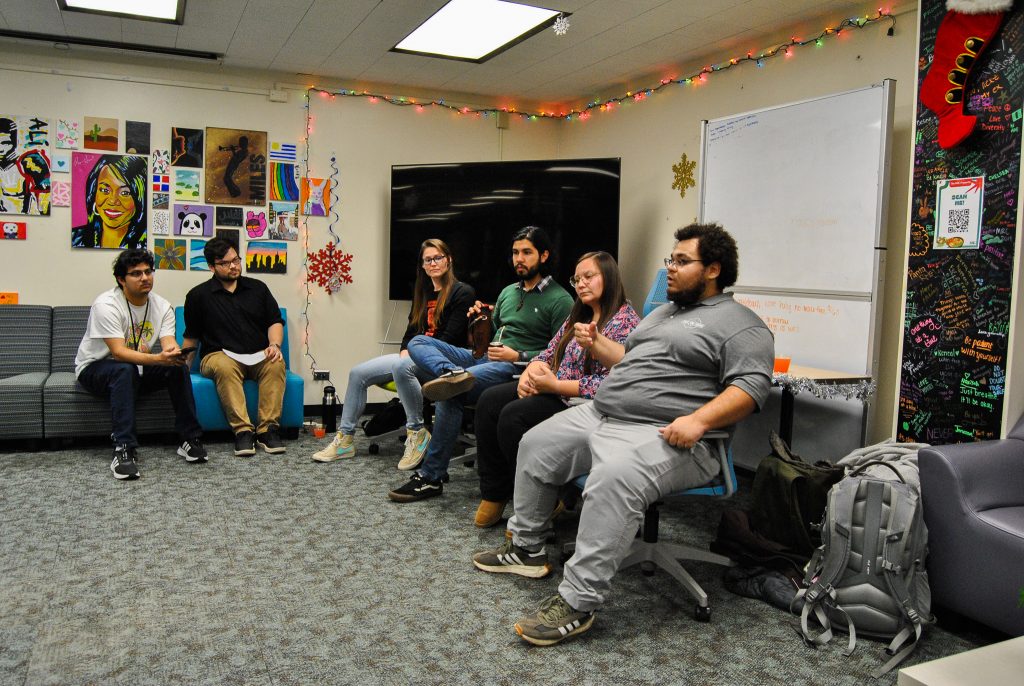A panel discussion hosted by the Multicultural Resource Center highlighted the journeys of Indigenous professionals at Binghamton University and beyond.
The panel, “Culture Chat: Native and Indigenous Research Spotlight,” took place in the MRC Lounge on Tuesday and brought together members of the campus community to learn from Indigenous voices and enjoy an assortment of traditional Haudenosaunee food.
Four speakers shared their academic interests and perspectives as Indigenous researchers — Emmanuel Clovis ‘22 MA ‘24, who earned his bachelor’s degree in integrative neuroscience and completed his master’s in biomedical anthropology in May; Natasha Korczak, who is pursuing a Pharm.D. at the University at Albany, shared insights from her path in health care; Taylor Hummel, a first-year Ph.D. student in BU’s anthropology department, who reflected on her research and experiences in the field; and Julio RuizDiaz-Rodriguez MA ‘24, who is a Ph.D. candidate at Cornell University.
“It’s really about highlighting and celebrating our Indigenous student, staff and alumni who are contributing to Indigenous knowledge, Indigenous community and really having that engagement,” said Ethan Tyo, the MRC’s assistant director of the center’s Native American and Indigenous Student Initiatives. “It’s really this chance to highlight their experiences but also the cultural impacts of what’s their journey into higher [education], because a lot of times these stories go unheard. So it’s a way to kind of give them spaces to elevate their voices, but also to share with the audience perspectives on being Indigenous.”
The panelists shared the motivations behind their academic and research pursuits, reflecting a blend of their cultural heritage and curiosity. Hummel, a citizen of the Tuscarora Nation, Bear Clan, discussed her research on migration and food practices, examining how Indigenous communities preserved their agricultural traditions during migration while adapting to new environments. She described the importance of exploring what practices were retained from previous areas of settlement, how communities adjusted to varying growing cycles and the ways they learned about and connected with unfamiliar ecosystems.
Clovis, whose maternal grandfather was Akwesasne Mohawk, spoke about his study of traditional diets and health care, highlighting food’s role as a form of healing. He described an initiative he aided in developing called “cohort database,” where traditional food items are compared to modern foods — like bison versus beef — to study diet’s impact on health.
The panelists then discussed the challenge of striking a balance between the academic and cultural responsibilities facing Indigenous researchers. Korczak, who grew up on the Onondaga reservation and is part of the Eel Clan, described how academics and culture made up two different parts of her life and how she compartmentalized the two due to stigmatization.
“I grew up on a reservation, I don’t know if you did, but a lot of people like look down upon education and view it as ‘not our way,’ and so it was hard growing up and being ‘smart’ and wanting to be educated and looking to pursue more education and to be more educated,” Korczak said. “So it’s hard to be judged and still try and be cultural.”
RuizDiaz-Rodriguez shared the unique struggles he faced as an Indigenous researcher from Paraguay, where assimilation policies create conflict with his identity and how he views his work.
“I think by the very nature of the way the globe works with global powers and periphery nature, it creates asymmetrical relationships between researchers, countries where a nation as a whole can be marginalized like Paraguay has, but then there’s also deep inequality between those marginalized nations,” he said. “And that’s something that I think I reckon with.”
The panelists shared strategies for staying grounded in the face of the unique challenges that come with their cultural and academic responsibilities. Hummel said she visits home when she feels detached from her support system. Clovis emphasized the significance of staying true to personal goals, describing the importance of finding a goal and sticking to it no matter what.
The event concluded with a brief Q&A session, allowing attendees to engage directly with the panelists. One audience member posed a question about the Three Sisters Garden on campus, which grows corn, beans and squash, and its impact on the University. Hummel responded, saying it is a great way to build connections and bring people to the area.
“This is just one of those communities to really spotlight, to bring in, these perspectives that we have of our students, our multicultural students that are so diverse,” Tyo said. “But at the same time honoring the ancestral lands that we are on, of bringing in their Indigenous perspectives.”



